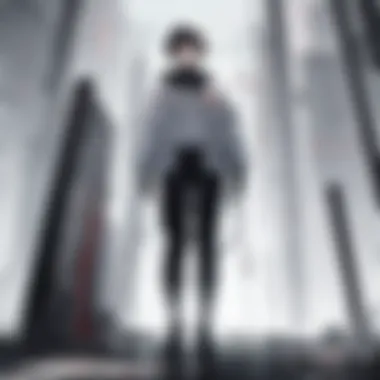Exploring Humanity's Response to Tomorrow's End


Intro
Imagining a scenario in which the world ends tomorrow yields complex implications across various dimensions of human existence. This concept resonates deeply with cultural and philosophical queries present throughout human history. Especially, in anime, these themes manifest frequently. The possibility of an apocalypse is approached with both dread and intrigue, highlighting human resilience and the wide-ranging responses to impending doom.
Anime Series Overview
In analyzing this hypothetical end, it is essential to explore how different anime tackle this idea. Various series revolve around apocalyptic themes, showcasing the actions and feelings of characters in face of the end.
Brief Synopsis of Plots and Key Themes
Diverse anime such as Neon Genesis Evangelion and Attack on Titan delve into dystopian narratives. They illustrate a world under strain, grappling with chaos. These stories often center around themes like sacrifice, survival, and the quest for meaning amid despair.
Foreword to Main Characters and Their Developments
The main characters in these series usually experience profound growth as they confront the looming apocalypse. For instance, Shinji Ikari from Neon Genesis Evangelion evolves through personal anguish and complex relationships in a fragile setting. Similarly, Eren Yeager from Attack on Titan portrays transformation driven by external and internal conflicts.
Discussion on Animation Style, Soundtrack, and Notable Episodes
The animation style in these series is often gritty and reflective of the weighty themes explored. The score in shows like Attack on Titan, composed by Hiroyuki Sawano, amplifies emotional stakes, elevating viewer engagement. Memorable episodes further expand upon crises that challenge both characters and audience perception of an impending end.
Character Analysis
Engaging with character intricacies unveils deeper themes surrounding an apocalypse. Characters are not merely observers; their struggles resonate within an auditory and visual context.
Detailed Breakdown of Main Characters, Their Personalities, and Motivations
Shinji Ikari’s indecision echoes the hesitation many feel when facing profound change. His need to connect conflicts as part of the human condition usually rings true.
Character Relationships and Dynamics
Cole, character partnerships shift drastically while determining strategies. These interactions often illuminate contrasting motivations - self-preservation versus collective survival.
Impact of Characters on the Overall Storyline and Fan Theories
Each character’s journey steers fan theories, prompting discussions beyond the final episode. Many fans engage deeply, weaving their interpretations that suggest more conversations about humanity’s fate and choices.
Genre Spotlight
A focus on how the anime genre of dystopia interprets catastrophic scenarios proves significant. The conversation stretches from science fiction to horror elements and their combined influence.
Prologue to the Genre of Dystopian Anime
As a genre, dystopian narratives deeply infiltrate modern collective consciousness. Themes of determinism alternate with those suggestive of human agency in time of unrest.
History and Evolution of the Dystopian Genre in Anime
Tracing back to early classics, this genre highlighted fears arising from technology and governance. Over time, stories evolved, promoting deeper character exploration against ominous settings.
Notable Series Within the Genre
Akira, a cornerstone of the genre, shares unsettling situations alongside human disconnection. Personality traits reflect broader societal symbols, establishing significant dialogues.
Behind-the-Scenes Insights
Understanding behind-the-scenes elements enriches appreciation for the craft. The production intricacies expose real-life parallels in art and argument, framing narratives.
Exploration of the Production Process
Animating such high-stakes themes requires a cooperative effort from talented staff, such as directors, writers, and animators. Each component proves crucial for executing an intricate tale of despair responded to with resilience.


Challenges Faced During Production
Tackling massive themes presents logistical challenges. Balancing audience engagement while hidden ideological messages requires extraordinary vision.
Success Factors of the Anime Series
The regard for profound moral calls within these stories usually retains resonance. The combination of artistic aspirations aligned with audience expectation frames the distinctive universality of angst, curiosity, and clarity under apocalyptic contexts.
Understanding the Concept of an End
Understanding the concept of an end is crucial in exploring what it means when the world is perceived to end, even hypothetically. This exploration sheds light on human emotions and the values we hold. Defining the notion of ending helps in grasping the weight of impending loss. Recognizing how this awareness influences our actions can create meaningful discussions not just about the end fact, but about living.
Defining 'End of the World'
To delineate 'end of the world' is to venture into philosophical and psychological terrains. It often goes beyond the literal meaning, reaching into the metaphoric implications. For many, 'the end' signifies daunting finality, encompassing various events like global extinction, disasters, or even existential dread caused by technological or societal changes. Definitions can shift based on cultural and personal lenses, reflecting a spectrum of beliefs and fears. The end is fundamentally about uncertainty. The Angst stirred by it compels communities or individuals to seek meaning, forming responses that indicate underlying beliefs about existence.
Historical Perspectives on Apocalyptic Events
Throughout history, societies have grappled with the notion of apocalypse. Various cultures experienced events they deem as potential world-ending moments. Notably, accounts within ancient religious texts hinted at catastrophes believed to juxtapose divine judgments. Other situations, like natural disasters or pandemics, triggered apocalyptic narratives, bearing witness to how cultures interpret an impending end.
Some historical perspectives include:
- The Black Death in Europe: Many believed this marked a biblical end.
- Y2K Fears: The turn of the millennium ushered fears of global systemic failures.
- Nuclear Threat during the Cold War: Heightened anxiety over potential nuclear conflicts reshaped how global citizens viewed destructive potentials.
Responses to apocalyptic moments spawned rich narratives in art and literature, marking decisive autobiographical links of how past experiences frame contemporary emotional landscapes. On these ideologies stand reflections of societal aspirations and apprehensions facing inevitability.
Human Psychological Reactions
Understanding human psychological reactions to the notion of the world ending offers a window into the myriad ways we process fear and acceptance. These reactions, when viewed through various psychological frameworks, reveal not only the fragility of human existence but also the coping mechanisms people employ in high-stress situations. Examining these elements adds a layer of depth to our understanding of the hypothetical implications discussed in this article.
Fear and Anxiety in Anticipation of the End
The prospect of an imminent apocalypse evokes powerful emotions, primarily fear and anxiety. These emotions can stem from a variety of sources: the unknown nature of the event, personal insecurities, or broader societal implications. When individuals are faced with the thought of impending doom, a common response is an overwhelming surge of panic.
In psychological terms, this reaction can be attributed to anticipatory anxiety, a state where the mere thought of a negative event can trigger stress responses well before any such event occurs. An individual's formative experiences, likelihood of trauma and cultural context frequently shape how one copes with fear. Collectively refusing doom might manifest as denial or attempts to rationalize why the end cannot happen.
Additionally, this emotional turmoil is not confined to the individual level. Group hysteria can emerge in communities feeling similarly threatened. A visceral response often includes conspiracy theories spreading quickly as people search for explanations to regain a sense of control. Affected communities may also engage in ritualistic behavior, displaying both a longing for purpose and the chaos unfolding around them. Recognizing these elements can help establish a dialogue on emotional resilience in the face of speculative crisis.
"Fear, as an extension of our primal instincts, insists on safety, impulsion, and normally leads to heightened tension within ourselves and our relationships with others. This stress, exacerbated by hyperawareness, culminates in efforts to address these fears before devastation occurs."
Acceptance: The Final Stage of Grief
Acceptance, theorized by Elisabeth Kübler-Ross, appears as perhaps the most compelling of the psychological responses to this hypothetical end. Originally part of her renowned stages of grief, acceptance manifests as a resignation to fate or a move beyond denial and bargaining.
In assessing acceptancehttp://en.wikipedia.org/wiki/K%C3%BCbler-Ross_model, integration of peace occurs when individuals resolve the realities surrounding their experiences and onset of mortality. Individuals frequently recognize what they still value, prompting attempts to strengthen connections with loved ones and those in their community.
However, true acceptance encompasses much more than just the resignation of oneself to fate. A decisive acceptance inspires profound reflection. Individuals might choose to articulate thoughts, meditations, or messages meant for those left behind, revealing deeper existential insights instead of antagonism towards mortality.
Intentions behind acceptance serve to rejuvenate personal relationships, encouraging discussions likely shied away from before. Such efforts can help foster necessary parnties in individualized expressions of willingness, which in this case become distinctly significant as life approaches its finality.
Recognizing acceptance is intricate—it can occur in harmonious moments juxtaposed beside despair. Society benefits remarkably from understanding how acceptance impacts individual and collective responses amidst speculation of endings. Cultivating this avenue promotes not only healthy individual frameworks but lays foundations for resilient societal approaches toward potential crises as well.
Philosophical Inquiries into Existence
Exploring philosophical inquiries into existence at a time when the world might end is fundamental to understanding the depth of human thought and concern. This perspective helps frame the delicate balance individuals maintain between existential comprehension and the realms of living life day to day. Humans take meaning in things and constructingaire emotions tied to conclusions and beliefs. When faced with the prospect of oblivion, significant question arise about the very nature of our reality, existence, and the validity of our experiences.
What Does Existence Mean When Faced with Oblivion?
When considering a hypothetical end to our existence, one might wonder what meaning or substance is left in life. Philosophical discussions about existentialism stress the enlightenment gained from knowledge of our own mortality. Ultimately, the realization of inevitable end prompts deep introspection. Allows individuals a chance to dissect layers of understanding our own being and purpose. Does meaning exist just in day-to-day pursuits, or can we derive significance from the awareness of life against an impending end?
This perspective influences numerous anime narratives, such as Neon Genesis Evangelion, which question human connection and individual validity while facing annihilation. Throughout literature and other visual media, the stark juxtaposition of ordinary experiences against the backdrop of oblivion serves as a launching platform for self-reflection. If the world were to end, people often realize that relationships, personal memories, and concluding resolutions within oneself become paramount in defining purpose.


Additionally, the confrontation with a potential end may evoke a sense of urgency to experience and rectify aspects of life that had remained unaddressed. Understanding one's existence as meaningful can shift the outlook of those grappling with the burden of finality. Stripped of distractions, some might find clarity; others may face despair.
Ethical Considerations in the Face of the End
In contemplating ethics surrounding a world ending tomorrow, critical questions emerge: How should an individual act? What responsibility does one bear towards others within the limited time frame? Such inquiries urge both introspection and immediate social consideration. Ethical reflections can include judgments about justice, service, and collective unity, often encouraging profound intervals of action to rectify past wrongs, even in an idealistic scenario.
Considering ethical behavior against chaos aligns intertwines with themes found in anime, notably within Attack on Titan, where characters face moral dilemmas in combating existential threats. These artistic displays necessitate ethical responses to survive, create openness for conversations regarding sacrifices, alongside the burden of choices in the face of destruction.
Engaging with ethical frameworks while confronting an inevitable end further enhances the intellectual discussin of both community and individuality. Valuing connections, enhancing foundations shared within familial or community ties matures the discourse on ethical vitality amid adversities. Distilling concepts philosophical communities foster around ideas of earnestness, reflection, and responsibility are enormously relevant determinants of how society might react if a virtual countdown featured unto the closing chapters.
In summary, the fusion of existential exploration and ethical analysis shapes robust dialogues worthy to pursue. Emphasizing experiences lived, intersects alive with implications entailed by potential obliteration under the garb of thought accelerates dialogues destined for positive outcomes, even amongst supposedly deterministic fates.
Cultural Depictions of Apocalypse
The way various cultures depict apocalyptic scenarios provides insights into their collective psyche. These representations reveal anxieties, aspirations, and deeply embedded values. They serve both as a warning and a mirror, enabling societies to reflect on their current trajectories. In an age of rapid technological advancement and existential threats, examining cultural depictions becomes vital.
Anime: Exploring End-of-World Themes
Anime often delves into themes of apocalypse and destruction. Series such as Neon Genesis Evangelion and Attack on Titan showcase societies under strain, raising critical questions about survival, morality, and human nature. Not just entertainment, these narratives prompt viewers to confront uncomfortable truths about existence.
Characters often grapple with chaos and uncertainty. Frequently, these stories blend personal struggles with global crises. For instance, Akira illustrates the repercussions of humanity's hubris and the fragility of civilization. The climactic scenes can evoke both despair and instill a sense of hope, although framed against a backdrop of turmoil.
The art in these anime complements the narrative. Dark and intense visuals represent the chaos of an ending world. They mirror emotions like fear, rage, and confusion. Unlike other media forms, anime tends to cultivate a unique emotional experience, allowing viewers to process their anxieties through these fictional lenses.
Literature and Cinema: Varied Responses to Finality
Literature and cinema approach apocalypse through diverse lenses. Classic works, such as The Road by Cormac McCarthy, present stark visions of survival. The desolate world echoes the fragility of humanity. Conversely, films like The Day After Tomorrow demonstrate humanity’s ingenuity. Here, society comes together to face disaster. This range reflects the complex relationship people have with catastrophic events.
- Themes Often Explored:
- Hope vs. Despair
- Individual vs. Collective survival
- Moral ambiguities and choices in dire situations
The distinctions within these works highlight differing cultural understandings of catastrophe. Some prioritize individual stories, allowing the reader or viewer to connect with characters emotionally. Others emphasize collective experiences that foster unity against a backdrop of despair.
Inconclusive outcomes often suggest the ambiguity of moral choices amid devastation, reflecting real-life uncertainties.
In both anime and literature, each portrayal serves to confront larger social issues. They question not just who we are, but who we can become when faced with our own ends. Such narratives leave lasting impressions, shaping how societies perceive existential threats across generations.
By examining these cultural representations, one gains not merely entertainment but wisdom. They offer succinct reflections of human nature, pushing readers and viewers alike towards contemplative thought about their existence and societal values.
Personal Reflections and Final Thoughts
The contemplation of individual responses to an unprecedented cataclysm opens a portal to a deeper understanding of what it means to be human. Personal reflections offer not merely a means of coping, but also an unconventional lens of clarifying values, ambitions, and connections. Within the chaos of an impending closure, the essence of interpersonal relationships often takes center stage, breeding both unity and solitude.
Individuals may envision various situations through which their last day unfolds. Imagining our last day compels us to face the ephemeral nature of life and scrutinize daily choices that mold our existence. Identifying what truly matters may spark engaging dialogues among friends and family but also highlights the specter of regret.
Conversely, the possibility of renewal post-end raises diverse viewpoints on rebirth, resilience, and the cyclical existence emphasized in multiple narratives. Within the gripping tensions associated with a potential world end scenario, there emerges a profound exploration of hope. No matter how bleak, the notion that tomorrow may pave way for a new beginning remains significant.
Social Dynamics under Siege
The concept of societies breaking under pressure during a catastrophic event presents a compelling viewpoint in understanding our nature as social beings. In a scenario where the world is ending tomorrow, the analysis of social dynamics reveals the intricacies of human behavior. The ways communities interact may shift drastically due to anxiety, survival instincts, and an immediate re-evaluation of societal structures.
When faced with apocalyptic situations, the collective responses of communities become foundational in addressing the necessities of survival and maintaining social order. The bond within individuals may strengthen, or it may fracture, depending on their shared experiences, fears, and objectives. This section discusses crucial elements regarding community resilience and the role of community identity in coping with catastrophe.
Some key considerations include the multifaceted dynamics at play:
- Shared Narratives: Communities often rely on shared stories that bond them. A common understanding of crisis may orient behavior, either fostering togetherness or breeding mistrust.
- Resource Allocation: Scarcity usually restructures social hierarchies. Decisions about who gets what become more critical in a collapsing world. Inequalities may heighten societal divides or catalyze sharing and cohesion.
- Psychological Impact: Arguments about shared fate can cultivate either cooperation or chaos. The fear of individual loss can either unify groups or fragment them into self-serving factions.
Community Responses to Catastrophe


Community responses during crisis moments vary significantly. These responses hinge on built-up relationships and shared values, encompassing both cooperative and competitive behaviors. In this context, several manifestations can help elucidate the subject.
A unified front often becomes the determining factor in survival under extreme conditions.
Communities that possess existing stable networks or norms typically fare better. Patterns emerging include:
- Mobilization of Resources: In well-structured societies, urgent responses often launch from local groups prioritizing aid and shared resource management to address immediate needs.
- Psychological First Aid: Humans deeply intertwined with their communities provide essential support by mitigating trauma and offering comfort. This not only serves as emotional healing but practically maintains function within relationships.
- Evolving Identities: As communities face their presumed demise, individuals may redefine their purpose based on new roles that emerge through necessity. Here, allegiance to the community becomes crucial.
The Role of Leadership during Crisis
In catastrophic frameworks, the role of leadership commands extensive analysis. Leaders serve as a linchpin when coordinating community efforts. Their ability to communicate effectively, offer support, and maintain morale underscores their value.
Effective leaders during crises often exhibit:
- Visionary Thinking: Insightful leaders navigate uncertainty with foresight. They need to anticipate obstacles rather than react on the fly, showing adaptability in volatile circumstances.
- Emotional Intelligence: The capacity to connect deeply with feelings in these times creates trust. Engaging followers on an emotional level solidifies loyalty and reinforces community unity.
- Transparent Communication: Clarity prevents misinformation chaos. Public announcements and discussions that clarify potent uncertainties foster edification, reducing widespread panic.
In summary, society-driven dynamics evolve in disarray through leadership frameworks. Community cooperation intertwined with judicious leadership maginalizes the deep intricacies of human connection in crisis, revealing robust patterns against timeless existential uncertainty.
The Scientific Perspective on Catastrophic Events
The scientific perspective on catastrophic events serves as a cornerstone in understanding how an impending end of the world might impact human life and society. Science provides a structured approach to analyze natural and man-made disasters. This analysis helps us gain insight into the occurrence, repercussions, and, importantly, the response mechanisms we may deploy. Examining catastrophic events scientifically allows us to differentiate between various scenarios that threaten existence. These insights are pivotal in preparing for such potential realities.
Natural Disasters and Their Implications
Natural disasters, such as earthquakes, tsunamis, or volcanic eruptions, reveal the inherent unpredictability of our environment. The potential for these events poses questions about humanity's fragility in the broader context of Earth’s geological history. Consider the following implications:
- Loss of Life and Property: Each significant natural disaster can result in considerable loss—not solely in terms of life but also in infrastructure and entire communities. This impact reverberates through society long after the initial event.
- Psychological Effects: Survivors of natural disasters often endure long-lasting psychological impacts, including PTSD and depression. Understanding these mental health challenges is crucial for effective rehabilitation strategies.
- Economic Consequences: Damages incurred have massive economic implications. Recovery often requires substantial financial resources and international aid, leading to shifts in global economics.
In areas specifically vulnerable to natural disasters, urban planning can help mitigate damage and loss. Scientists advocate for strategies incorporating advanced predictive models to enhance preparedness.
Technological Armageddon: Realities and Myths
In the discussion of potential apocalyptic scenarios, technological armageddon stands out as a blend of science fiction and a credible concern. This concept refers to cataclysmic outcomes resulting from technological advancements, including artificial intelligence, nuclear war, or cyber warfare. Addressing these considerations is essential:
- Artificial Intelligence: Rapid advancements in AI could lead to unforeseen consequences. The fear isn't merely about the machines turning against humans, but rather the ethical dilemmas and decision-making that oversights might present.
- Cyber Warfare: Our increasing reliance on technology heightens vulnerability to digital attacks. A single breach could disrupt critical infrastructure, evoking widespread panic and substantial chaos.
- Nuclear Capabilities: The presence of nuclear weapons continues to pose an existential threat. Reliability on diplomatic dialogues and various treaties plays critical roles in reducing escalating tensions.
Critical discourse in scholarly articles must examine these parameters. By augmenting our understanding of these topics, society can work toward mitigating risks while preparing for potential consequences of a technological disaster. In this multifaceted view, the interplay of advancements and ethical realities shape our future significantly.
Concluding Insights
The examination of a hypothetical world ending tomorrow is not simply an exercise in speculation. This disucssion reveals important considerations regarding human nature, philosophical resilience, and cultural interpretations of finality. By addresssing multiple aspects, this section aims to present not only a conclusion but also an introspective look into the implications of end-of-world scenarios.
Recognizing how individuals react to imagined cataclysms can foster a deeper understanding of our own existences. These realities evoke practical lessons. They encourage us to appreciate the present. In exploring how communities deal with existential threats, insights emerge on what connects people during times of panic. This interconnectedness can cultivate more informed relationships that extend into everyday life, urging society to find strength within its diversity.
A Call for Mindful Living in the Present
Living with conscious awareness becomes paramount when believing that time runs out. The urgency to appreciate life—whether fleeting moments of joy or harmonious connections—takes the center stage. If an impending end looms, reflections transform into mere observances of mundane phenomena. Here lies the intricate balance of perception: recognizing life's impermanence while responsibly engaging with it.
Practicing mindfulness encourages individuals to reevaluate their priorities. It prompts questions like, Are each day’s experiences significant? and, What fears hold me back? The answers can reveal a path towards self-improvement and personal grace. Thereafter, encountering apocalyptic themes, whether in anime or discussions, might serve as catharsis.
“Mindfulness allows us to open our minds to possibilities that otherwise may remain obscured.”
Here are several practices to foster a mindful approach:
- Daily Reflection: Spend a few minutes each day reflecting on positive experiences.
- Gratitude Journals: Write down things to be thankful for—it emphasizes abundance over lack.
- Balanced Interactions: Focus on quality, rather than quantity in relationships, helps build supportive networks.
Lessons from Fiction and Reality
Art imitates life, and often it reveals complexities that reality struggles to articulate. Fictional works, particularly in anime and film, tackle apocalyptic themes with nuances not always understood in real life. Characters face dilemmas that encourage audiences to recllect on morality, choices, and their profound significance.
The ways these stories present hypothetical ends serve as reflections of real societal issues. By presenting new realities, they challenge predetermined ideas and open space for critical thought.
Lessons learned from both fiction and real-world events remind us of several important ideas, like:
- Unpredictability of Life: Sudden changes can shape tomorrow, urging us to fully embrace today.
- Value of Human Connection: No matter the circumstance, it is relationships that afford comfort in desperation.
- Resilience in the Face of Crisis: Both media and lived experiences reveal that humans can adapt to challenging environments.
Exploring these lessons bridges understanding and prompts deeper inquiries into our collective consciousness, shedding light on fundamental issues we often overlook.







